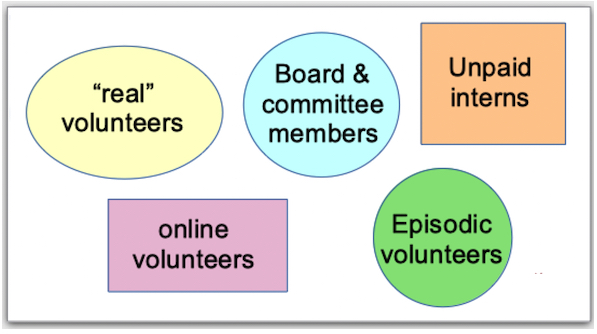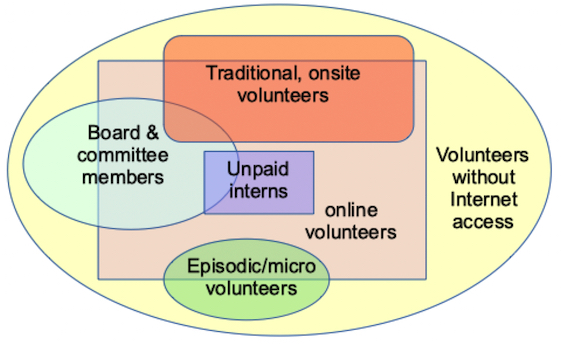I really do mean that headline: I hope we will stop talking about virtual volunteering.
What I mean is: I hope we will stop talking about online volunteers versus onsite volunteers. I would be so happy to never hear the phrase “virtual” volunteers, distinguishing them from “real” volunteers, ever again. I hope that, at last, all managers of volunteers realize they need to be using the Internet to engage and support ALL volunteers.
Co-author Susan Ellis and I wanted The Last Virtual Volunteering Guidebook to be a turning point, to be the last time anyone talked about using the Internet to engage and support volunteers as something separate and completely different than engaging and supporting traditional onsite volunteers. We hoped the book would be the moment that virtual volunteering stopped being segregated to separate books or a separate chapter at the end of a volunteer management book or a separate workshop on volunteer recruitment, volunteer support, etc.
Sadly, the publication of the book was not the turning point we were hoping for.
So… could the pandemic and the massive rise in popularity of virtual volunteering be that turning point? Could this be the moment that we stop thinking of volunteer engagement this way, with groups completely segregated from each other:

And, instead, we think of volunteer engagement this way, with everyone in the yellow oval being volunteers and intersecting together, and being in more than one grouping?

They are all volunteers. And unless the volunteers don’t have Internet access, you should be using the Internet to engage and support all of your volunteers – to refuse to do so creates so much more work for you, the manager, and leaves out so, so many people as volunteers – it undermines any goals you might have regarding diversity and inclusion.
(Yes, there are volunteers without Internet access – just as there are volunteers who don’t like your traditional thank-you banquet and choose not to attend, or volunteers who don’t like working with the public or in groups and prefer to work behind-the-scenes, alone. No one thing you do onsite, face-to-face is appropriate for all volunteers.)
If you are writing a book or teaching a class about the basics of volunteer management, it should talk about using the Internet to support and engage volunteers – not at the end, but throughout the book or workshop. If you are going to focus on how to
- identify tasks for volunteers
- recruit volunteers
- keep volunteers engaged/volunteer retainment
- recognize/honor volunteers.
Then you should be talking about:
- identifying tasks people can do online, not just onsite
- using the Internet to recruit volunteers for both onsite and online roles and tasks.
- using Internet tools to keep volunteers engaged/volunteer retainment
- using your web site, YouTube, social media and other Internet tools to recognize and honor volunteers.
You don’t even have to say the phrase virtual volunteering in your workshop or article. People don’t think of themselves as online volunteers – just as volunteers, so why are you talking about them as this completely separate group?!
Also see:
- How to Immediately Introduce Virtual Volunteering at Your Program: roles & activities a nonprofit, charity or other program could launch immediately to involve online volunteers (and, indeed, you never have to call it virtual volunteering).
- Free training in virtual volunteering (involving & supporting volunteers using online tools): a list of my videos on virtual volunteering in 2020.

The Last Virtual Volunteering Guidebook is a volunteer management book for anyone that supports or engages volunteers, or who cares about the overall volunteer engagement at their agency. The book has never been just for people that want to involve online volunteers. In fact, the book emphasizes support for ALL VOLUNTEERS more than any other topic. When Susan Ellis and I wrote The Last Virtual Volunteering Guidebook, we never envisioned a global pandemic creating this massive, sudden shift to virtual volunteering for so many agencies, and I’m glad the book has been helpful to so many in these trying, fatiguing times, but I worry that people are thinking of virtual volunteering as something that will go away when the pandemic eases. Just as virtual volunteering is a practice that’s more than 35 years old and undertaken by thousands of organizations long before 2020, it will continue to be not only a reality, and an expectation.
Also see:
Request to all those training re: volunteer management (blog).
My own training videos (all free!).

If you have benefited from this blog or other parts of my web site or my YouTube videos and would like to support the time that went into researching information, developing material, preparing articles, updating pages, etc. (I receive no funding for this work), here is how you can help.
